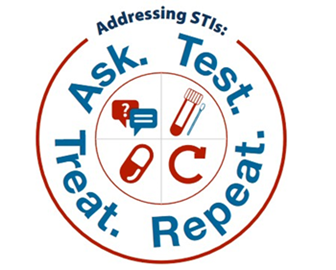Background
Sexually transmitted infections (STIs) are known to increase the risk of HIV transmission and acquisition with risky sexual behaviors. Although the national incidence of HIV infection has decreased over recent years, the rates of common STIs such as chlamydia (CT), gonorrhea (GC), and syphilis have not. In addition to increasing the risk of HIV transmission from a non-virally suppressed person, STIs are a continuing public health concern because of other associated morbidities and mortalities. Despite national recommendations for screening and treating STIs in people with HIV or at risk for HIV, gaps exist in the regular screening, treatment, and prevention of STIs among people with HIV.
Approach
This SPNS Initiative implemented needs-based training, clinical and non-clinical interventions. The goal was to improve screening, testing, and treatment of common bacterial STIs among people with HIV or at risk for HIV who are served by HRSA’s Ryan White HIV/AIDS Program (RWHAP) and/or Bureau of Primary Health Care (BPHC) funded clinics or health centers. Nine clinical demonstration sites in three United States (U.S.) jurisdictions, Florida, Louisiana, and Washington, D.C., were selected to participate in this pilot demonstration project because of higher than national average incidences of GC, CT, syphilis, and HIV.
A baseline needs assessment was conducted with each of the nine clinical demonstration sites. The goal was to inform the selection and subsequent evaluation of clinically appropriate interventions to increase and/or improve STI screening and treatment among people with HIV and people at risk for HIV.
Based on findings from the needs assessment the nine clinical demonstration sites implemented the following interventions:
| Intervention | Intervention type |
|---|---|
| Provider Training | Training |
| Self-Collected Nucleic Acid Amplification Test (NAAT) Specimens | Clinical |
| Audio Computer-Assisted Self-Interview (ACASI) Sexual History | Non-Clinical |
| LGBTQ Welcoming Space | Non-Clinical |
| Provider Detailing Program | Systems Level |
Effective interventions identified through this project include STI screening, testing, and treatment resources for national use to assist in dissemination of successful interventions for long-term sustainability across the United States.
